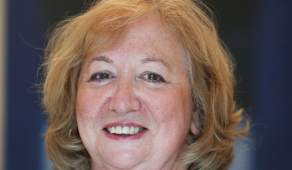Strike ballot puts further strain on under-pressure NHS
Unison, which represents 350,000 NHS staff across England, Wales and Northern Ireland, originally called for an above inflation pay rise for health staff and is seeking an increase on a flat rise of £1,400 awarded to health staff in England and Wales earlier this summer. The award could not be implemented in Northern Ireland due to the political stalemate there. In Scotland, Unison has suspended a strike ballot of its 50,000 health members following an improved pay offer at the end of last week.
The ballot will run until 25 November in England and Wales (18 November in Northern Ireland). ‘Striking is the last thing dedicated health workers want to do,’ said Unison general secretary Christina McAnea (pictured). ‘But with services in such a dire state, and staff struggling to deliver for patients with fewer colleagues than ever, many feel like the end of the road has been reached.’
Staff were leaving at alarming rates, she added, taking jobs that paid better and were not so demanding. ‘It feels like the NHS is in the last chance saloon,’ she said. ‘But a vote for industrial action might be the jolt that convinces ministers to make the NHS the priority they say it is.’
Strikes were ‘not inevitable’ and ‘an inflation-busting pay rise’ could help get the NHS back on the road to recovery.
However, the calls for an increased pay rise come at a time of extreme financial pressure and with inflation, as measured by the retail price index, currently standing at around 12%.
The flat rise of £1,400 would increase the pay bill in England by 4.8%, with percentage increases for individuals ranging from 9.3% for the lowest paid down to just 1.5% for those on the highest AFC bands. However, the government’s settlement for the NHS only allowed for a 3% pay rise, with NHS England having to cover the unfunded £1.8bn additional cost, along with higher than assumed inflationary pressure, from within its own budget.
New prime minister Rishi Sunak has already talked of ‘difficult decisions to come’ as he seeks to close an estimated £35bn hole or more in the country’s finances. Chancellor Jeremy Hunt has delayed his autumn budget from 31 October to 17 November. While this means the Office for Budget Responsibility’s forecasts will be based on more up-to-date and a more optimistic economic outlook, spending cuts are still expected across government departments.
This does not align with the government funding further pay increases for health staff, which would have an immediate impact as well as raising recurrent costs. And given current financial pressures, it would not be realistic to expect NHS England or local systems to fund further increases from existing budgets. However, with the Scottish government having already increased its pay offer, the other UK governments are in a difficult position.
In June, the Scottish government offered an across the board 5% pay rise for AFC staff. But, with Unison already balloting for strike action, last week it put an enhanced offer on the deal. The union has now suspended its ballot while it puts the new offer to members.
The new deal would deliver an average increase of 7%, but, as with the offer in other parts of the UK, is structured as a flat pay rise of £2,205 for all staff. This would result in pay rises of 11.3% for those on the lowest band, reducing to just 2% for band 9. While the majority of AFC staff would receive an increase of between 5.4% and 11.3%, anyone from the top of band 7 upwards would be worse off than under the original deal.
Other unions have also been balloting or planning to ballot for industrial action. Unite has already called on its members to reject the new offer in Scotland. ‘The principle of a flat rate increase is right and fair to address imbalances in pay across grading structures,’ said the union’s industrial officer, James O’Connell. ‘However, ultimately this new offer would still not see experienced NHS workers with any real improvements in their pay.’
There are also major concerns about pay levels in social care. Recently the Care Quality Commission called for a step change in thinking about how to attract and retain staff in adult social care. Better pay, rewards and training were all part of the solution. And this week, in a letter to the returning health and social care secretary Steve Barclay, the NHS Confederation reiterated calls for a new national minimum care worker wage of £10.50 an hour to improve staff retention.
Related content
The Institute’s annual costing conference provides the NHS with the latest developments and guidance in NHS costing.
The value masterclass shares examples of organisations and systems that have pursued a value-driven approach and the results they have achieved.